Introduction
- Over 50% of students are lifetime users (Pearson, Liese, & Dvorak, 2017).
- Over a quarter used the substance past month (Pearson et al., 2017).
- Some groups are specifically vulnerable.
- Music genres correlate with substance use.
It has been estimated that over half of the college student population regularly use marijuana, while over 25% used it during past month (Pearson et al., 2017). Some populations are specifically vulnerable based on their ethnicity and participation in some subgroups. African Americans and Hispanics are more likely to use marijuana than White or Asian Americans. Music is also associated with the development of certain preferences in people. Hip hop and rap are music genres that are closely linked to marijuana use. The content of hip-hop songs is regarded as one of the factors enticing young adults and adolescents into using marijuana.
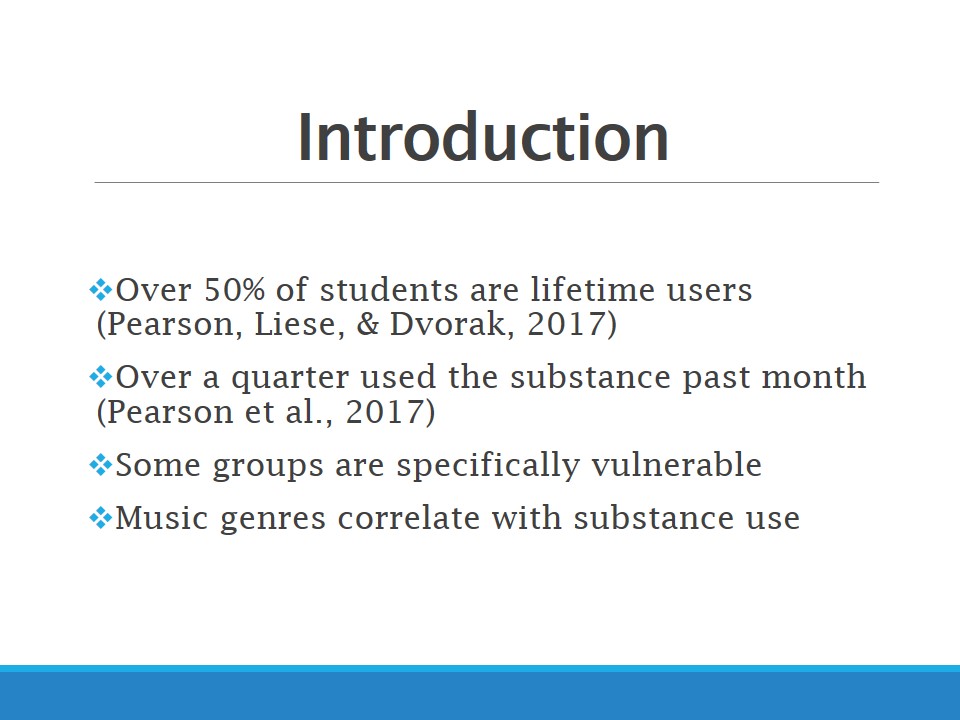
College Years
- Time of freedom from parental control.
- New friends and influences.
- Developing new preferences (Beazley & Field, 2018).
- Becoming a part of the group.
College years are associated with a specific period of people’s lives when they gain almost unlimited freedom. Adolescents and young adults often try new things during their college years as they are exposed to a variety of new experiences (Beazley & Field, 2018). They find new friends and develop new traits of character as well as preferences. They often become members of some groups, which affects their behaviors and choices they make. The use of marijuana and other types of substance is a common trend on the college campus where students continue exploring their identity in diverse ways.
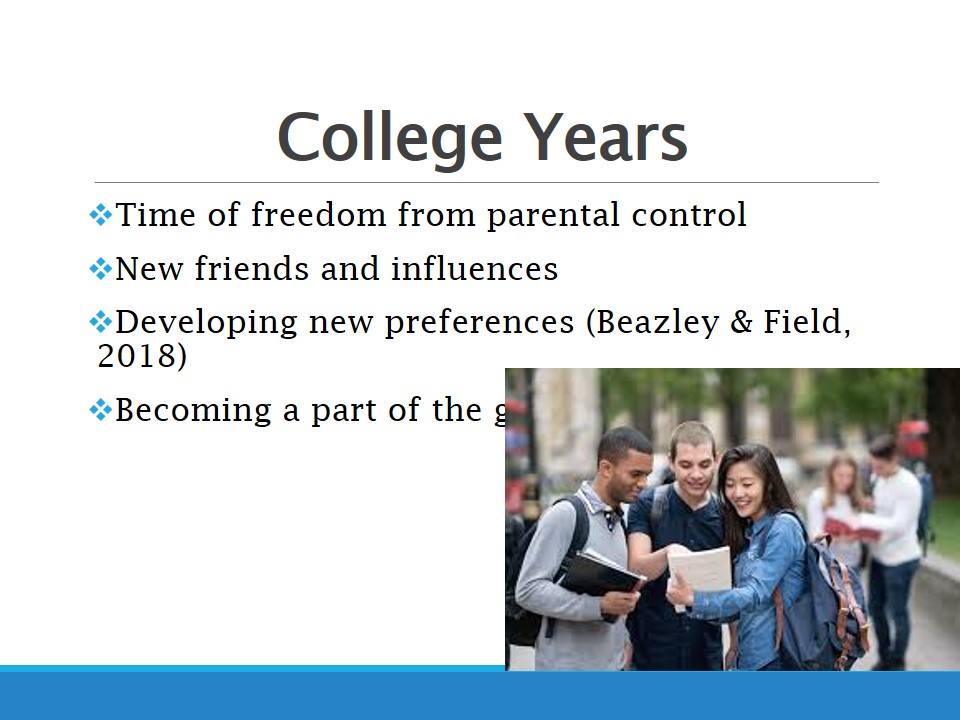
Hip-Hop Culture
- Ethnicity.
- Socioeconomic background.
- Criminal aspect (Emdin, 2015).
- Freedom and no authority stance.
Hip hop emerged in the second part of the 20th century and was associated with minorities (Emdin, 2015). African Americans created this genre as well as the culture that became a considerable part of the cultural landscape of the American society. Although hip hop is mainly associated with the life of minorities and underprivileged people, people of different ethnic and socioeconomic backgrounds are hip hop fans. It is noteworthy that the criminal aspect is rather strong in hip hop ideology as various illegal activities and risky behaviors are major topics of hip-hop songs. Hip hop celebrities are often engaged in such activities and even have a criminal record. One of the central values of hip-hop culture is people’s freedom and no authority stance.
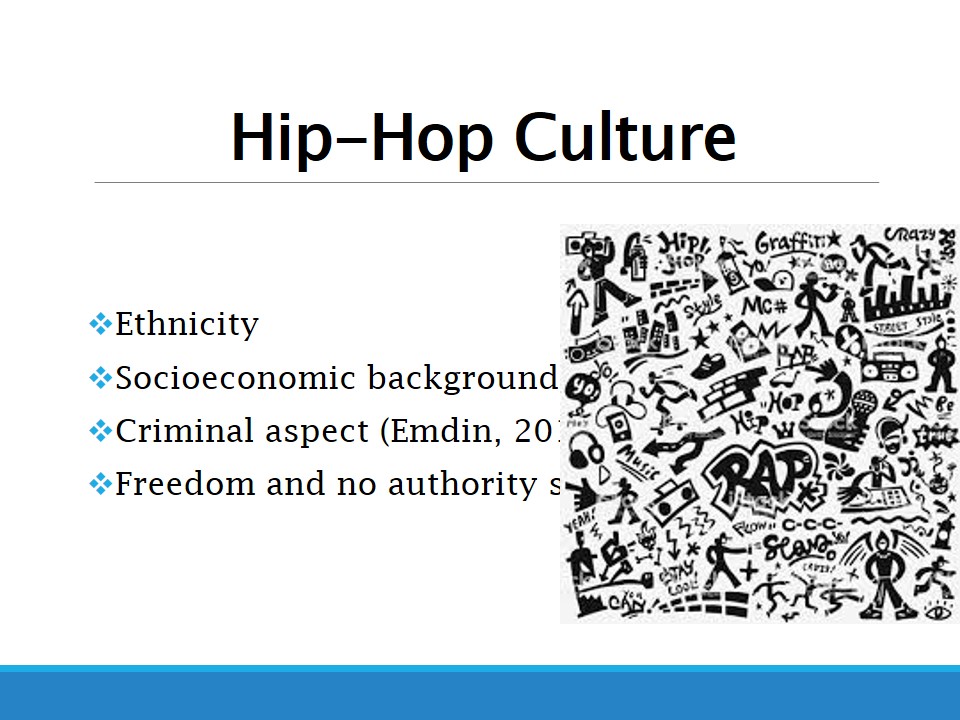
Risk Behaviors in Hip-Hop Songs
- Substance use.
- Sex as a casual relationship.
- Disregard for consequences (Holody, Anderson, Craig, & Flynn, 2016).
As mentioned above, hip hop culture is associated with risk behaviors. One of the reasons behind such an attitude towards this subculture is the prevalence of certain themes in hip hop songs. Lyrics often contain positive accounts regarding the use of marijuana and alcohol. Substance use is displayed as an indispensable part of human being and something that makes it meaningful (Holody et al., 2016). An important theme that is recurrent is disregard for consequences, which can be seen as a call for engaging in various risk behaviors. The life of hip-hop celebrities also serves as an illustration of this way of life, which is publicized in the media and often mimicked by adolescents and even young adults.
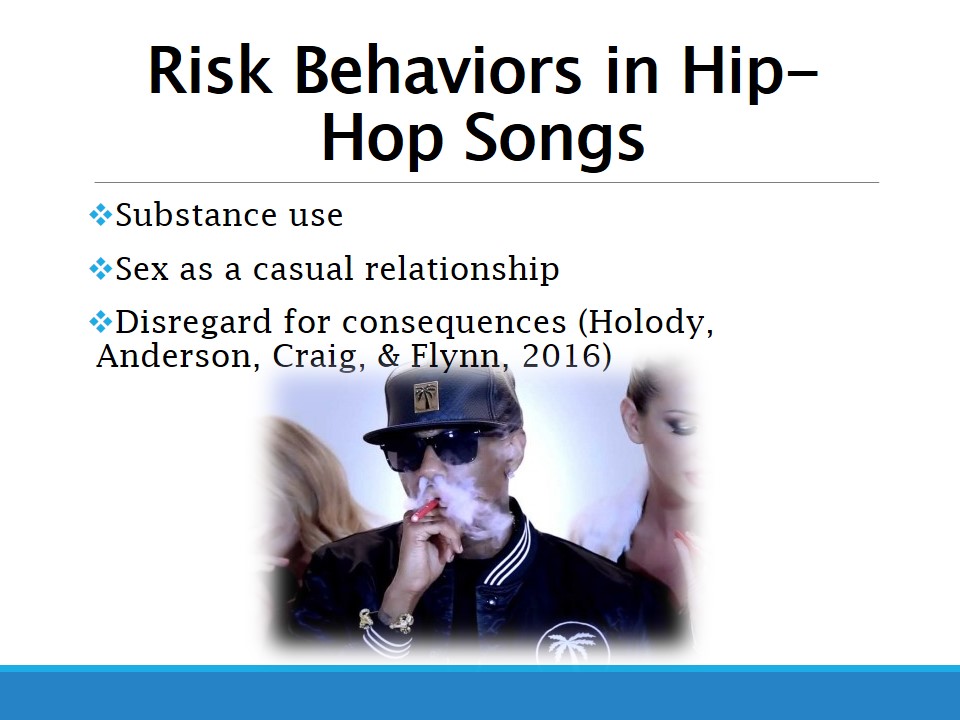
Hip Hop and Media
- Hip hop dominates a large part of media content (Oluwoye, Whembolua, & Merianos, 2017).
- Music, cinematography, and TV.
- Celebrities, hip hop, and ways of life.
Hip hop is now one of the most popular genres of music as well as subcultures among adolescents and young adults (Oluwoye et al., 2017). Hip hop works constitute a significant part of numerous music award ceremonies and hit parades on TV or radio. Social media can be regarded as another potent channel of the spread of hip-hop culture. Hip hop celebrities, as well as those who share the corresponding values (actors, pop singers, and athletes), tend to be role models for thousands and even millions of teenagers and people in their twenties.
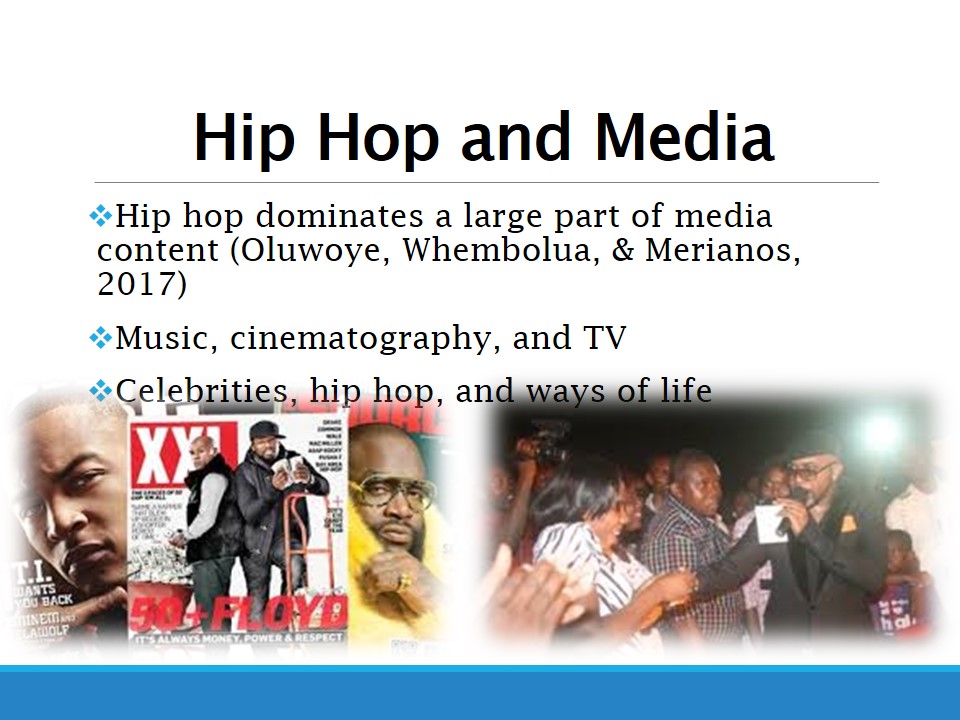
Music and Substance Use
- Different genres affect people’s risk behaviors in diverse ways (Wright et al., 2018).
- Mediating factors include gender, ethnicity (and culture), and socioeconomic status (Oluwoye et al., 2017; Wright et al., 2018).
It has been found that different genres of music have an influence on people’s choices and behaviors. For instance, those who prefer country music tend to use or abuse alcohol, while the fans of hip hop prefer using marijuana (Wright et al., 2018). However, some factors can mediate the influence of music and divert people from substance use. These factors include gender and socioeconomic status of families as females tend to avoid using marijuana or alcohol and family’s income correlates with the abstinence from risk behaviors (Wright et al., 2018). Oluwoye et al. (2017) also report that African Americans are more likely to use marijuana as compared to Africans, so the authors conclude that culture is a strong mediator of people’s attitude towards drugs.
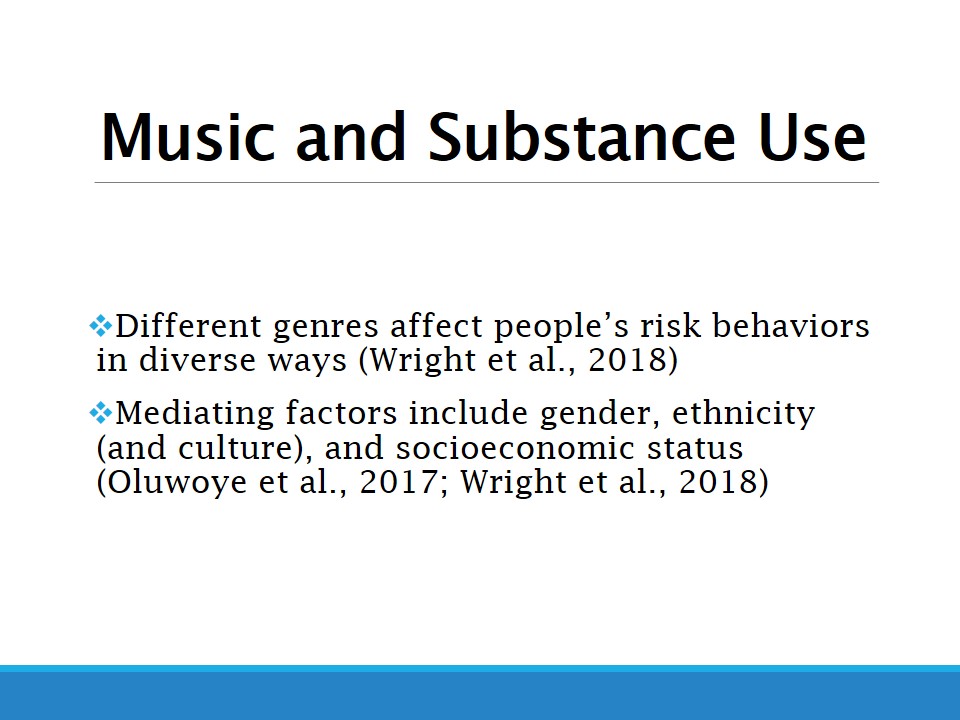
Hip Hop, Marijuana Use, and Ethnicity
- Peer groups (Moran, Villanti, Johnson, & Rath, 2019).
- Lyrics.
- Hip hop culture.
Hip hop affects people’s decisions to engage in risk behaviors (including marijuana use) in many ways. Moran et al. (2019) note that people who associated themselves with a peer crowd related to hip hop culture were likely to be current users of marijuana. Hence, peer pressure or the values existing in a subgroup have a strong influence on people’s health choices. As mentioned above, hip-hop culture also affects people through the media, as certain values are promulgated. Finally, hip-hop songs serve as a mediator of marijuana use as lyrics often contain such themes as marijuana use, marijuana as a remedy, marijuana as a lifestyle.
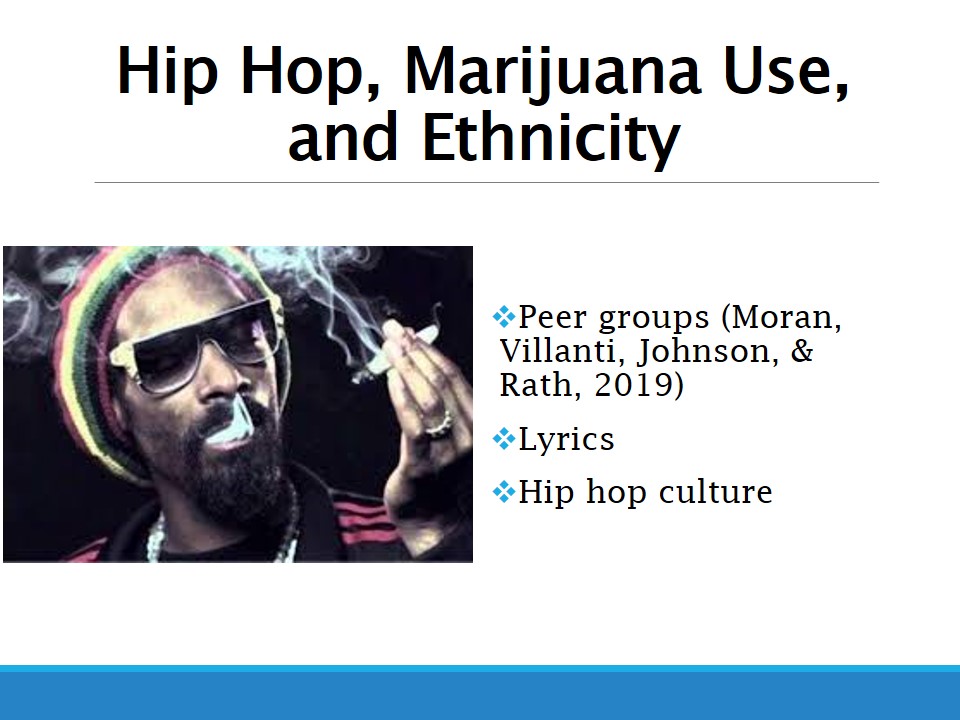
Consequences
- Disregard for consequences.
- Addiction.
- Health issues (Bechtold, Simpson, White, & Pardini, 2015).
- Low academic performance (Arria, Caldeira, Bugbee, Vincent, & O’Grady, 2015).
As mentioned above, hip-hop culture propagates a disregarding any consequences of risk behaviors, including marijuana use, which contributes to the increase in the number of marijuana smokers. Nevertheless, research shows that these consequences cannot be ignored (Arria et al., 2015). Addiction is one of the primary concerns as any addictive behaviors impede people’s wellbeing (Bechtold et al., 2015). Low academic performance is one of the consequences that have been acknowledged and need to be addressed (Arria et al., 2015). Although health outcomes of using marijuana are still highly debatable, some studies show an increased risk of developing cancer, cardiovascular disorders, and mood-related disorders. It is noteworthy that further research is needed as the findings regarding health issues associated with marijuana use are rather conflicting.
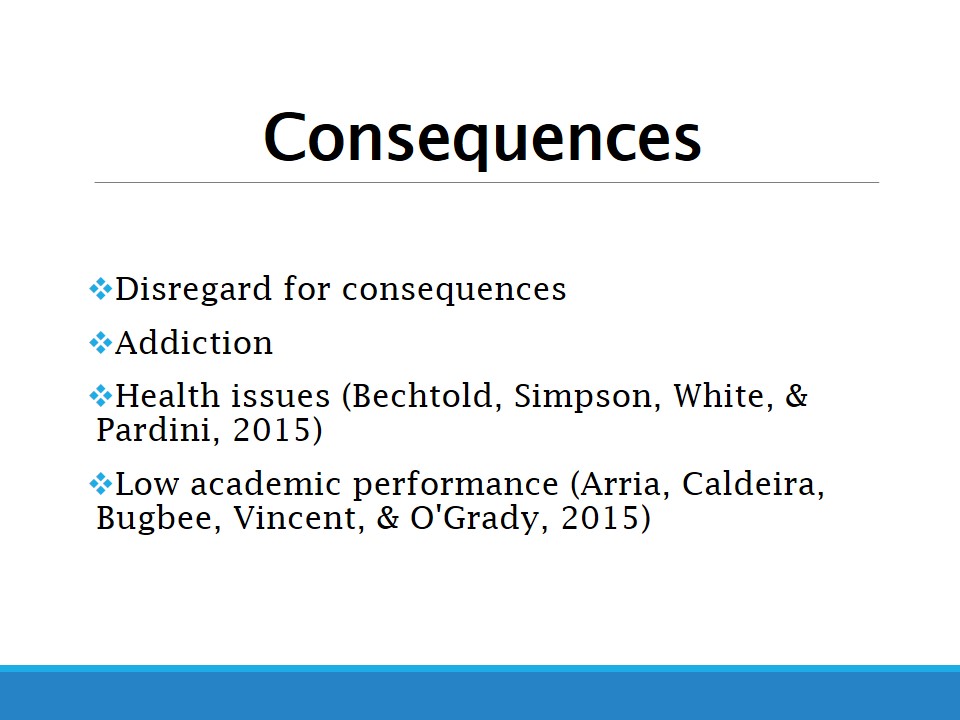
Interventions to Prevent Substance Abuse
- School-based interventions (Arria et al., 2015).
- Peer crowds (Moran, Walker, Alexander, Jordan, & Wagner, 2017).
- Hip-hop-based education.
Prevention has been regarded as the most effective way to address substance abuse. Therefore, school-based interventions have considerable potential to discourage young people from using marijuana (Arria et al., 2015). Programs targeting peer crowds have proved to be effective as well since they result in the development of values that are inconsistent with substance use. Finally, the incorporation of hip-hop culture into an educational setting is an effective way to promote a healthy lifestyle and academic achievement (Emdin, 2015). A combination of these efforts can also lead to positive results and the development of proactive behaviors.
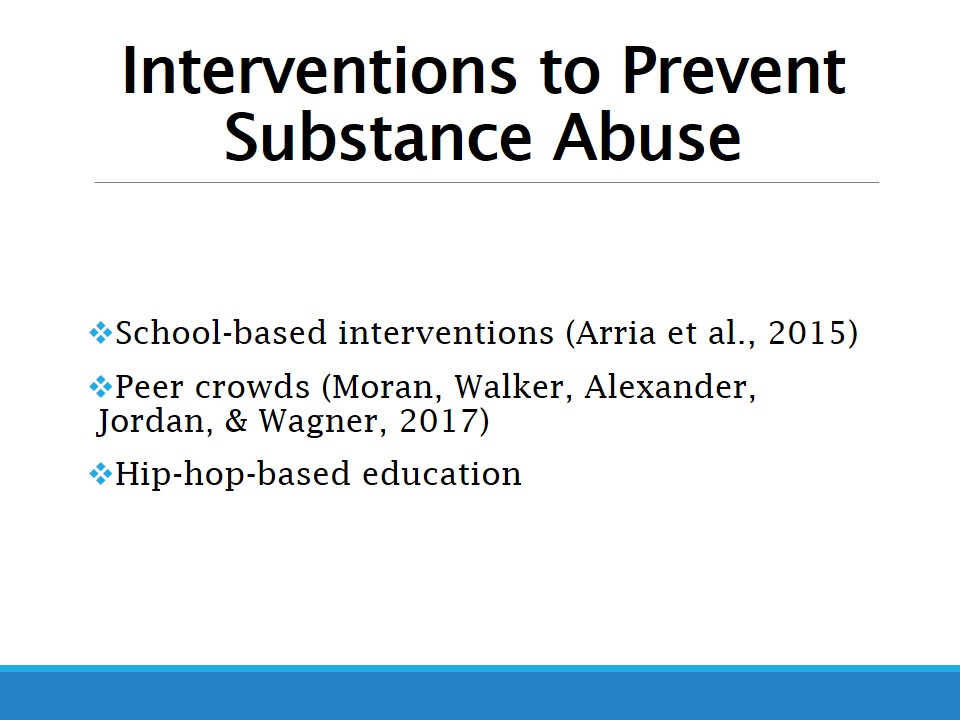
Conclusion
- Hip hop is closely linked to marijuana use.
- Hip-hop culture, the media, ethnicity, and socioeconomic status as major mediators.
- Negative consequences for college students.
- Interventions to prevent marijuana use.
Hip hop is the music genre that is associated with substance use. The primary factors enticing people into using marijuana include hip-hop culture, ethnicity, media coverage, and socioeconomic status. Using marijuana has adverse effects on academic performance, which may cause considerable issues for college students. In order to prevent young people from using marijuana, researchers and practitioners come up with school-based interventions that target certain populations and peer groups. Hip-hop-based education is another way to divert students from engaging in risk behavior in question.
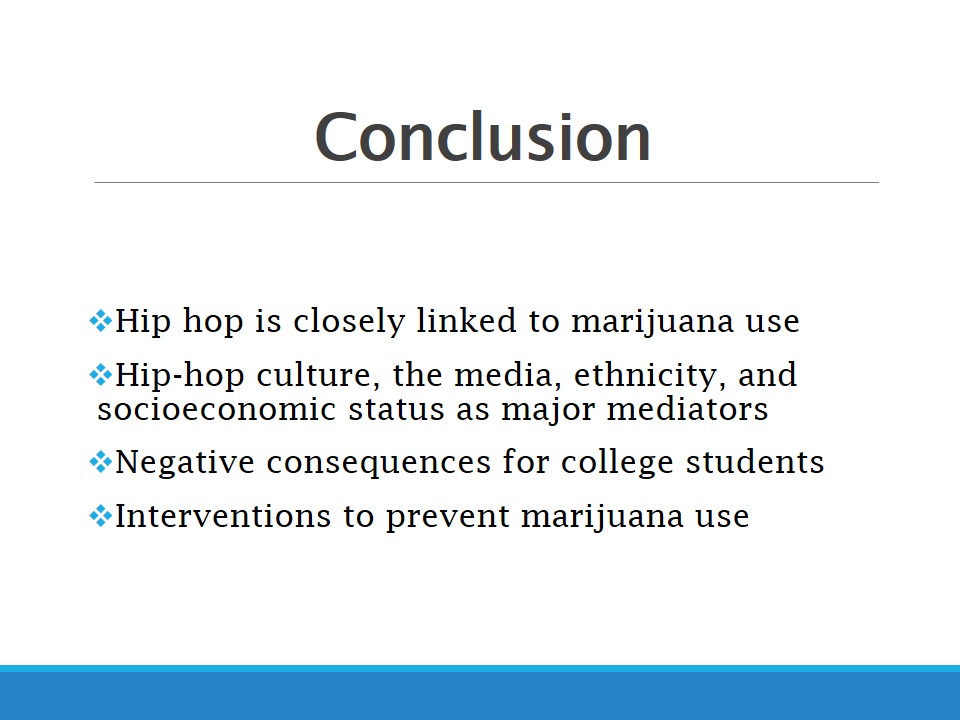
References
Arria, A. M. , Caldeira, K., Bugbee, B. A., Vincent, K. B., & O’Grady, K. E. (2015). The academic consequences of marijuana use during college. Psychology of Addictive Behaviors, 29(3), 564-575. Web.
Beazley, J., & Field, S. (2018). Cannabis on campus: Changing the dialogue in the wake of legalization. New York, NY: Routledge.
Bechtold, J., Simpson, T., White, H. R., & Pardini, D. (2015). Chronic adolescent marijuana use as a risk factor for physical and mental health problems in young adult men. Psychology of Addictive Behaviors, 29(3), 552-563. Web.
Emdin, C. (2015). The rap cypher, the battle, and reality pedagogy: Developing communication and argumentation in urban science education. In M. Lamont Hill and E. Petchauer (Eds.), Schooling hip-hop: Expanding hip-hop based education across the curriculum (pp. 11-28). New York, NY: Teachers College Press.
Holody, K. J., Anderson, C., Craig, C., & Flynn, M. (2016). “Drunk in love”: The portrayal of risk behavior in music lyrics. Journal of Health Communication, 21(10), 1098-1106. Web.
Moran, M. B., Villanti, A. C., Johnson, A., & Rath, J. (2019). Patterns of alcohol, tobacco, and substance use among young adult peer crowds. American Journal of Preventive Medicine, 56(6), e185-e193. Web.
Moran, M. B.., Walker, M., Alexander, T., Jordan, J., & Wagner, D. (2017). Why peer crowds matter: Incorporating youth subcultures and values in health education campaigns. American Journal of Public Health, 107(3), 389-395. Web.
Oluwoye, O., Whembolua, G. L. S., & Merianos, A. L. (2017). Extending the reach: The influence of social media and culture on substance use among African and African American male college students. Spectrum: A Journal On Black Men, 6(1), 59. Web.
Pearson, M. R., Liese, B. S., & Dvorak, R. D. (2017). College student marijuana involvement: Perceptions, use, and consequences across 11 college campuses. Addictive Behaviors, 66, 83-89. Web.
Wright, C. L., Ball, T., Kambour, K., Machado, L., Defrancesco, T., Hamilton, C., … Dauk, J. (2018). Music and substance use: A meta-analytic review. Journal of Ethnicity In Substance Abuse, 1-30. Web.